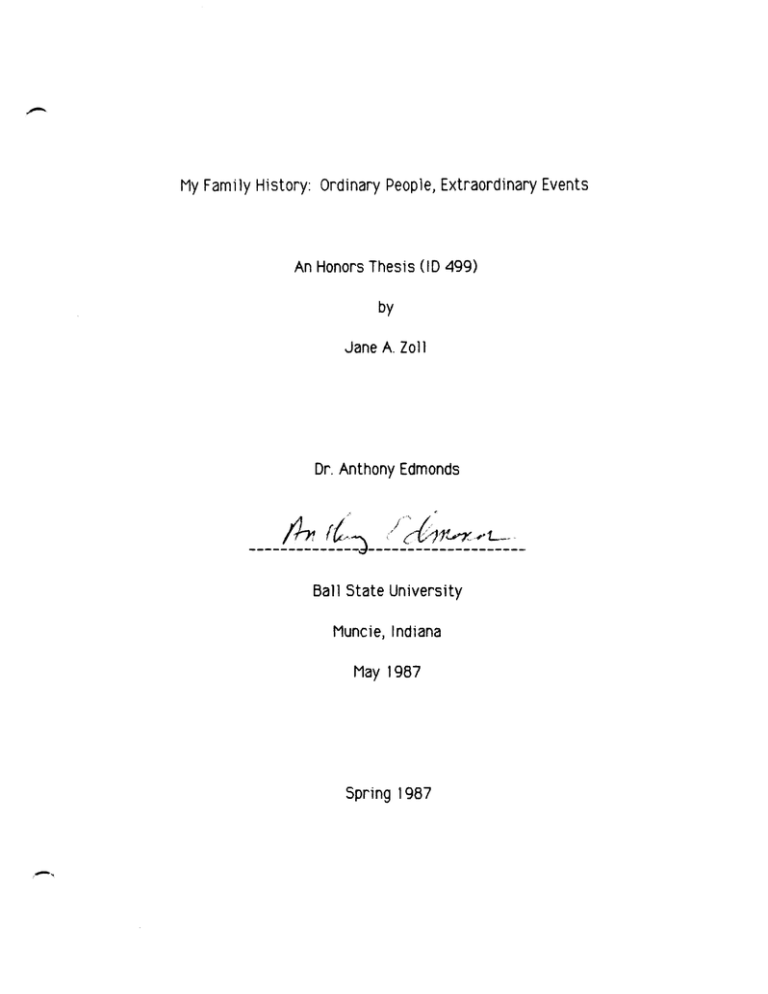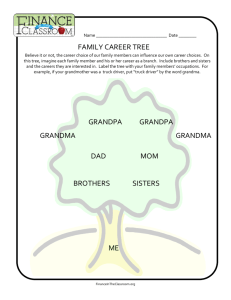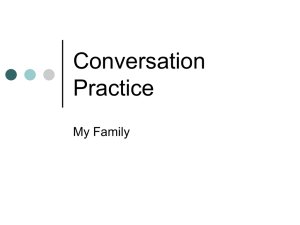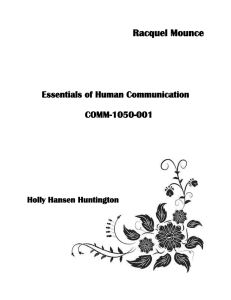by
advertisement

My Family History: Ordinary People, Extraordinary Events An Honors Thesis (10 499) by Jane A. Zol1 Dr. Anthony Edmonds Ball State University Muncie, Indiana May 1987 Spring 1987 ~'I'l ~ 1: T;", j:' Very few historical facts which I learned in high school history classes have stayed with me through the years. Researching my own family has helped me to observe wars and depressions, not from the point of view of the leaders, but from the vantage pOint of those who suffered through them. It fascinates me to think that events such as the World Wars, which once seemed trivial to me, actually changed my life. I can now understand the personal, tragic side of such events; not just read about the political or economic consequences which resulted. This paper is about my family and the way they were affected by some major events in American history, beginning with the first World War. World War I broke out in Europe in 1914. From the beginning of the war, President Wilson tried to maintain a policy of neutrality and urged the United States citizens to refrain from taking sides. According to Norman, et a1. (1986, p. 650), United States neutrality was unrealistic for three reasons: ethnic groups in the United States naturally took sides, America had strong economic ties with the Allies, and Wilson's top ranking officials were sympathetic to the Allied cause. From a European perspective, practically any move that the United States made was a shift to one side or the other. Pure neutrality proved to be too difficult to maintain. President Wilson was a man of high ideals. He desperately wanted to keep the United States out of the war and managed to do so for two and one half years. On May 7, 1915, the British passenger liner, L(Jsitani4,. was attacked by German submarines off the coast of Ireland. The ship, carrying 128 Americans, exploded, capsized, and carried 1,198 people to their deaths. President Wilson viewed the sinking of the L(Jsitania as a vicious attack on innocent people, but he refused to launch a military 2 retaliation. For some Americans the sinking of the Lusitania was the perfect excuse to join the war. Others, however, wanted to avoid war at all costs (Dollar, et . a1., 1982, p. 718). In February 1917, Germany launched unrestricted submarine warfare. In late February of the same year the British decoded a telegram from German Foreign secretary, Arthur Zimmerman, to the German minister in Mexico. Americans were shocked at the contents of the letter: Germany promised th help Mexico gain back territories it lost to the United States if Mexico joined a military alliance against the United States. On April 2, 1917, President Wilson came before Congress and shared his belief that: -The world must be made safe for democracy". Wilson gave the following reasons for America's willingness to declare war against Germany: Germany's violation of the principle of freedom of the seas, disruption of American commerce, attempt to stir up trouble in Mexico, and violation of human rights by killing innocent Americans. Congress quickly passed a declaration of war resolution (Norton, et al., 1986, p. 654). During this time of international warfare, my grandparents were growing up in northern Indiana. My grandfather, Ralph Leroy Coppock (born on August 6, 1904), hved in Marion with his parents and 7 brothers and sisters. Grandpa's father, Harry Coppock, moved the family to Marion from Parkersburg, West Virginia in 1910. While in West Virginia Harry tended an orchard high up on Craggy Mountian. One of the primary reasons Harry decided to move was because of the unpredictable education available for his children in Parkersburg. Schoolmasters would come to teach at the school, and in many cases they would leave after only two or three weeks. - School would be cancelled until another schoolmaster happened along. 3 - Grandpa remembers that when the family arrived in Marion, Harry only had a dollar left in his pocket, and they used boxes as makeshift furniture. During World War I all of the kids took walnuts to school to aid in some aspect of the war effort. He also told me about the children trying to knit different items for the "boys" overseas (Ralph Coppock, April 1987). Grandma Nena was born on Aprll 27, 1905. Perhaps because she was still young and uninterested in world affairs, she was not significantly impressed by the magnitude of the World War I. It seems that life continued as usual in the rural community of Poneto, Indiana, where she grew up. Life as usual, however, was not without its personal tragedies. Grandma was bom Nena Ellen Romine. Her father, Samuel Romine, worked for the railroad keeping the tracks between Montpelier and Poneto clear. Her mother, Be11e Van Camp Romine, was about 20 years younger than Samuel. I have been told that their marriage was arranged because Be11e was a rebellious young woman who needed a stable environment in which to settle down. I don't know why the marriage took place, but Be11e evidently was not satisfied with it. On Christmas eve in 1913 she took her youngest two chi ldren, Nena and David, to the dime store. She left them there and ran off with another man, Uriah Cupp. Samuel came to town later in the day. Realizing what had taken place, he bought each of the children a small gift and took them home. Grandma described her father as a kind, gentle man. She loved him and depended on him a great deal. One day in the month of September, 1914, Grandma spent the day near Pennville with her dad. He had been - working on the farm most of the day and Grandma came into the barn to find him lying on the floor. She thought he was taking a nap, but he had died of a 4 - heart attack. That evening, at the age of nine, Grandma took on the responsibi1ity of caring for her two year old brother, David. David and Nena were soon taken into separate homes. Nena went to live with Charley and Stella Hart (Stella was Samuel's sister) and David was taken in by another local family. Eventually, both children lived with and were adopted by Charley and Stella. The adoption papers became official the seventh day of October, 1922. The decade of the 1920's, often referred to as "The New Era" in American history, was characterized by an American dominance in world affairs. By 1920 the United States was the world's leading economic power, and it rose to the top of world trade. American companies expanding overseas during the war years did not meet with intense competition from European nations because they were preoccupied with the war (Norton, et al., 1986, p. 675.). Another aspect of American life that was taking off with a new fervor was spectator sports. Popular spectator sports included boxing, college football, golf, tennis, and above all else, baseball: America's pastime. American Ufe seemed to be heading in a new direction (Watts and Davis, 1983, p. 160'>' The twenties marked new frontiers in the lives of my grandparents also. My father's parents, Willard and Nena Zoll, were married February 11, 1925. My mother's parents, Ralph and Ethel Coppock, were married in 1927. Grandma Nena told me that she had quite a few gentlemen calling on her in the early twent ies. Stella would chase all of the young men off - before they got a chance to see Nena. Stella chased Wi llard off a few times, but he was persistent. Grandma and Grandpa courted for 2 years before their 1925 wedding which took place in Bluffton. After they were 5 - married, Willard and Nena moved in with Wi11ard's parents -- a typical arrangement at the time. Wi l1ard's parents were David and Harriet Zo11. David and Harriet l1ved in a house that they had built themselves just southeast of Bluffton. David came to We11s County from Clinton County, Ohio in 1880. It was in We11s County that he met and married his wife, Harriet Ann Jones. David, like his father before him, spent his whole life farming. Nena and Wi11ard also farmed until Willard passed away in 1972. On the other side of my family, Ralph and Ethel were married in Gas City, Indiana, in 1927. Grandma and Grandpa didn't plan an elaborate wedding due to the fact that neither of them had any money. According to Grandpa (Ralph Coppock, Apri 1 1987), they found the preacher working in the garden. He stopped long enough to perform a wedding, and the only guest was an insurance salesman who happened to be present. Soon after my grandparents were married, the Great Depression took its to11 on the United States. The "New Era" of the twenties had turned into a nightmare. Many people flocked to the United States in pursuit of the American Dream: if you work hard you wi11 succeed. There were few success stories during the Great Depression. Unemployed men roamed about the country in search of work. Many found nothing at all. These men, who were raised to believe that if you worked hard you would succeed, felt guilty and worthless when they could not find work (Oates, 1983, p. 183.). Grandma Nena's l1ttle brother, DaVid, was a man who was unable to find work on a steady basis during the Depression. The business of wandering across the country, which he was forced into in the 1930's, characterized David's entire life. Nena wrote the following poem, probably in 1969: Where is my baby brother, Whom I have loved so long? 6 He roams the earth through hill and dale, No place to call his home. - He's sick, and starved, and oh, so co ld. He cares not for home or gOld. They'll find him dead in a lonely place No friendly plot his body to embrace. David died in Billings, Montana on October 6, 1972. He was hit by a train. No one in Billings knew who he was or how long he had been there. Grandma was not notified of the death until December of 1972. The last stanza of the poem was penciled in, December 1972: He was killed by a train, so they say, At Billings, Montana, far away. Buried in a cemetery in Yellowstone County In a potter's grave, so they say. The Depression was not Quite so severe for the rest of my family. Nena and Willard, who had been farming since 1925, had seen nothing but lean years. Grandma remembered that economic success was more difficult during the Depression, but pOinted out that farming had never been easy for them. The fact that they had two sons, Robert (born in 1927) and Roger (born in 1931), forced them to stretch the money that they were able to make. My other grandparents were living in Marion near the rest of their family during the time of the Depression. Grandpa Ralph told me that he was not hurt by the Depression nearly to the extent that other people in town were. As a matter of fact, Grandpa was able to hold onto jobs painting cars for three companies. He remembers other people waiting in line for handouts, and his own father, Harry Coppock, worked for the Works Progress 7 - Administration painting bridges and doing other such jobs. My grandpa's sister, Opal, was born in 1920. She was sti1lliving at home with her parents during the Great Depression. She told me that her father would worry about putting money back for taxes; which added up to a total of twelve dollars. He told his kids, "Don't ever ask for candy," yet nearly every week he would manage to bring them some orange slices or circus peanuts. Two blocks away was the grocery store where my great grandparents purchased necessities. During the Depression Harry charged 200 dollars worth of groceries at that store. Just when conditions began to improve for Harry and he was beginning to find work again, the man who ran the grocery store died. Many people who had run up a bill at the store felt that they were off the hook. They did not feel obligated to pay the grocer's widow; after all they had done business with her husband not with her. J J Soon this woman came to my great grandfather to make a deal with him. She and her husband owned four houses that had become run down during the Depression. She asked Harry if he would consider fixing up those houses so that she could rent them rather than paying cash for his grocery bill. Harry agreed. The arrangement helped both of them out a great deal. Harry was skilled in interior decorating. He was a painter and a paperhanger and he J sanded and polished wood floors. Opal said that people who were rich were the ones who had their wal1s papered and those who were poor just had J their walls painted. My great grandfather could hang wal1paper of any design so well that the pattern was always continuous; rarely was anyone - able to find the creases between strips. During the Depression of course, J interior decoration was one thing that most people were able to do without. 8 The economy was not the only aspect of life in Marion that was less than desirable. Racial prejudice was at its peak in the twenties and thirties. Opal gave me an account of her famlly's reaction when two Negroes were hanged on Marlon's courthouse square In 1931. My grandfather came to the house in the middle of the night and said, "Dad, get up. They're hanging 'niggers' in Marion!" At that time Harry was running a grocery store nearby, a venture which lasted only a short time. Harry and two of his sons, Ralph and Laurence, went into Marion that night. Harry had been out West at some pOint, and he had seen some terrible racial incidents occur. He told Laurence and Grandpa to be sure and stay by his side. He told them that "men do things they would never do if they had a couple hours to think about it first" when confronted with situations such as this (Opal Rogers, April 1987). Two Negroes were hanged by rope on the northwest corner of the courthouse square. One other culprit was spared because he was so young. Evidently those hanged had kllled a "white boy" from a good famlly in town. The event which inspired the murder and later hangings was nothing more than an argument over a girl (Opal Rogers, April 26, 1987). The other side of my family was not directly affected by racial strife. Racial relations were something that they read about in the paper, not an issue to be dealt with every day. Willard and Nena moved from their Wells County farm to a farm in Wabash County near Lagro, in 1938. My dad was seven years old in 1938. He real1y liked the Wabash County farm and he took his own family there many - times before his death in January 1987. The farm is beautiful even today. 9 - The only evidence that a house ever stood on the property is a cement foundation with tall grass reaching through the cracks. The house stood at the end of a long, winding lane with a creek running across it. The creek did not present much of a problem; under normal conditions a person could walk or drive right through it. When the creek was flooded, however, the car was left parked on the side nearest the road and the driver had to get to the other side on his/her own. (When my dad told stories about walking miles and miles to school, crossing creeks, etc., he probably was telling the truth!) The creek, which crosses the lane, weaves its way through the woods and empties itself over the edge of a cliff. The water trickles down the side of the rock, barely making a ripple as it enters the still pool below. Although my dad's family only lived on the Old McGrew Farm for seven years (until 1945), the time spent there held a special place in their hearts. Grandma wrote the following two poems. The first one reveals one of her fondest memories: watching her boys play on the Old McGrew Farm. Oh, how I miss the old place Back the lane, upon the hill. Everyone so happy. The memory llngers still Of the falls where my boys played And always had such fun. My little, chubby fellows Would romp and play 'til day was done. This next poem was written to my father and uncle. It was dated May 11, 1969 -- Mother's Day: - Are Both My Boys In? I think often as night draws nigh Of the old farmhouse on the hi 11, Of t.he yard that slanted down to the creek 10 Where the boys played at will. And when the night at last came down, Hushing the merry din, I'd look around to see, "Are both my boys in?" It's many a year since then. The old house is gone that stood on the hil1. No longer echoes my boys feet. The old place is gone and still. But I see it all as the shadows creep, And though many years have passed since then I still want to ask of Dad, "Are both my boys in?" I wonder if when the shadows fall On that last, short, early day When we say goodbye to the world outside All tired of our chi1dish play, When we step out into that other land I wonder if I'll watch and wait 'Til both my boys are in? It seems difficult to believe that Grandma could have had such fond memories of a place that was so peaceful and perfect when World War II was raging elsewhere around the globe. The Second World War began in 1939, and its approach went virtually unnoticed by Americans who were struggling through the Depression. Many Americans, including leading politicians, believed that United States involvement in World War I was a mistake and that Europeans were trying to drag us into another of their endless conflicts. Citizens here wondered about Germany's activities in - Europe but still felt safe and hoped that the United States could stay out of the war. 11 These hopes were shattered on December 7, 1941, when Japan launched a surprise attack on Pearl Harbor. The United states soon declared war on the Axis powers of Germany, Italy, and Japan. The Pearl Harbor incident united and activated the American people, and patriotism was evident everywhere as the nation geared up to defeat the Axis powers. World War II was an event that affected all American families. For many Americans the war proved tragic as sons, husbands, and fathers were ki lled in far away places. Over 400,000 Americans lost their lives in the war and 670,000 returned wounded (Watts and Davis, 1983, p. 198). My grandfather's brother, Raymond Coppock, was one of the soldiers who returned to the states after being wounded. Raymond was married in October 1941 and went to the service in March 1942. He went to Europe to fight with General Patton's Third Army. Near the end of the war, Raymond's company entered the small town of Trig, Germany to "clean out the snipers" Raymond was shot in the head by one. His buddies told him to stay down and lie still until the paramedics could come to him. Raymond stayed put for a while, but he did not want to be left behind by himself. He did not feel any pain, just numbness. so he got up to follow the others. As soon as he stood up he was shot once through the hip and once through the stomach. Until this time Raymond had been writing home regularly. When the letters stopped arriving. his family back in Marion feared the worst. They wrote to army officials to find out where Raymond was. They received no word from the army and still no word from Raymond. After placing more - inquiries, the family learned that Raymond had been shot three times, his brain had been pierced one half inch deep, and he was suffering from 12 amnesia in a European hospital. Soon a nurse began to write letters home for him. Raymond underwent surgery. His skull was cut, part of it was removed and a platinum plate replaced the damaged bone. This surgery was one of the first of its kind ever done, and the entire procedure is recorded on film. Raymond was one of the last soldiers to return to the United States. Even when he did arrive in the States, he spent time in a Michigan hospital going through extensive therapy. Before Raymond was able to return to his family, he had spent five years in hospitals all across the world. Laurence Coppock's son, Earl, was another member of my family who knew firsthand the horrors of the war. He spent most of the war years in a prison camp in Munich, Germany, where he was stabbed in the leg with a bayonet. He remembers eating bread made partly of sawdust and coal. When Earl returned home he had lost all of his hair. Both Earl and Raymond agree that war should always be avoided at all cost. Grandpa Ralph was too young to be drafted in WWI, and he avoided the draft in WWII because he was in his thirties, had three children, and was running an essential business. Grandpa ran a body shop in Marion. He said his number one priority was keeping trucks on the road so that local businesses could continue production at full force. Famlly cars were fixed only if there was nothing else in the shop to be worked on. Even then Grandpa could not buy parts for automobiles. He often used whatever metal he could get his hands on, made it fit, and painted it. Automobile parts were among the items not produced during the war. AJI the metal was used to - build war machines. My mom remembers saving tin foil and going on scrap drives to collect tin cans or other metal items which could be used to build tanks or planes. 13 Families were cutting back on items which were strictly rationed or in limited supply: gasoline, tires, sugar, meat, canned goods, and coffee. My grandmothers quit wearing nylons, and my parents, along with their grade school classmates, sold war bonds and collected mllkweed pods which were used to make parachutes. Mom remembers that the closest thing you could get to candy during the war was Smith Brothers black cough drops. Men stood in line outside the drug stores in Marion hoping to be able to buy cigarettes. Mom told me that cars had stickers in the windows which read: /5 this trip re.allrne.ce.ssary? People at home gave up much to support the war, and were seemingly glad to do so. They were propagandized to the point that they hated anything and everything about Japan; whatever needed to be sacrificed in order to put the "Japs" in their place was gladly sacrificed by the American public who were fanatically patriotic. According to Dollar, et a1. (1982, p. 658.), many American families were uprooted during the war and the decade following it. They migrated in large numbers to the cities where all of the industrial labor was taking place. My family did not fall into that pattern. My father's family continued to farm, and my mother's famlly actually moved away from the city to live on a farm in 1946. Grandpa Ralph's job was affecting his health to the extent that my grandmother insisted that he stop working on cars and try his hand at farming. He had developed a constant cough from working around the paint fumes, and Grandma wanted him to work out in the fresh air. Grandpa - purchased some farm land in Wells County and built a truck stop on part of the property. He farmed the land whi le my grandma and their three daughters ran the restaurant. 14 There was a hickory tree standing right on the spot where Briarwood Truck Stop was supposed to be built. Grandpa started building around the tree which wasn't cut down until the family had gathered that year's nuts. They thoroughly enjoyed living in a rural area, but I think my mom and her younger sister, Sandy, got the biggest kicks out of country life. My grandpa used horses to farm with, and Mom and Sandy spent hours riding them through the woods. Their usual form of entertainment in Marion was going to the movies on Saturday evening. Although trips to the movies were becoming increasingly rare, the girls did not forget some of the things that they saw at the theater. One movie in particular inspired Mom and Sandy: Sheen~ Oueen of the Jungle. Pat, the oldest of the three girls, was not Quite as thrilled about riding the horses and playing in the woods as her two young sisters were. As a matter of fact, she was seventeen when the fami ly moved away from Marion and she was mainly interested in boys, dresses, and make-up. Mom and Sandy took Pat's formal dresses out to the woods so that they could dress up like Sheena and swing across the creek on vines. Sheena always wore long dresses in the movies, and besides, Pat hardly ever wore her formals. Mom and Sandy just figured she would never miss the dresses. She missed them, but it was about a year before she ever found them hanging over branches deep in the woods. It would have been much safer at that point to have stayed in the movie theater and out of the jungle. Of course, getting the entire family ready to see the show was not always easy. Grandma Ethel always spent time getting dressed up to go to - the movies. One Saturday evening when she was finished getting ready she slipped on a bar of soap and plunged into the bathtub which was full of water. Everyone laughed to see her sitting in the tub, soaking wet, with her 15 hat sitting crooked over one eye. No one went to the show that night, and I imagine Grandma was furious that Grandpa and the kids even thought to laugh at her. Grandpa not only built Briarwood, he also built two houses on the property. One, of course, was for his family, and the other was intended to be a cottage for weary travellers. Grandpa discovered that there was a lot more paperwork associated with running the cottage than he expected so he decided that the idea was not such a good one. The bui lding was already under construction, but Grandpa did not have any definite plans for it. Whi Ie Grandpa was bui lding Briarwood his parents were running a small grocery store and gas station in Roll, Indiana, a town just a few miles away. Unfortunately, the store (along with the residence on the second floor) was destroyed by fire. leaving my great grandparents without a home. Grandpa and all of the family pitched in on the weekends and finished building the little cottage which became home for Harry and Luzetta. My mom finished high school in rural Wells County with much of her family living just as close as they had lived when she was growing up in Marion. Mom graduated from Jackson High School in 1952, along with the other eight members of her senior class. The main activity in Jackson township was watching the boys basketball team play other local high schools. My mom and her sisters were dedicated fans, although the team rarely was victorious. Mom also spent a lot of time working in the - restaurant which had become a favorite spot for high school students from all of the surrounding schools: Liberty Center, Hartford City, Montpelier, Chester Center, and many others. 16 Mom met her first husband, Bi 11 Creager, while working at Briarwood. When Mom married him in October of 1952, she really was not in love with him. During their engagement, as a matter of fact, Mom broke off the relationship while Bill was serving in the military in Virginia. When he got back to Indiana his mother invited Mom over to their home in Hartford City for supper. Mom was not too crazy about going but Grandma Ethel said she should go since Bill was a "soldier boy". Grandma did not encourage her to marry Bill, however. No one in Mom's family wanted her to get married to him. She even remembers her older sister, Pat, crying at the wedding. The couple was often referred to as "Beauty and the Beast" since Mom was very attractive and ... well, the rest probably needs no explanation. It never really occurred to Mom to go to college or pursue a career. She honestly just wanted to get married and have children. Looking back, Mom wishes she would have gone to school for a nursing degree. When her children were born (Connie Sue in 1953, and Barbara Jean in 1955) she could not believe they were cute. She was afraid she would have "bald-headed little freaks" (Betty Zoll, April 1987). Mom was divorced in 1957. She was devastated by the divorce, and it took her a long time to get over it. She really thought that anyone who got divorced was a failure. One thing that helped her out was that her pastor and her church stood by her side. Another thing that helped was that Bill came back to her wanting to patch things up. When she found out that she could have him back she realized that she did not want him. - My dad, Roger David Zoll, graduated from Liberty Center High School in 1949. His ambition upon graduation was to continue working on the farm. The last thing he wanted to do was serve in the military. 17 After the Second World War the world was placed in a state of fear and instability, due to deteriorating American-Soviet relations (the Cold War). The world was in serious economic trouble, many European and Asian cit ies had been reduced to rubble in the war, and agricultural production was low. Many wondered how the world would ever piece itself back together. America and Russia each offered a different model for the rebuilding. These two major powers sought to claim influence in countries which previously pledged their allegience to the Axis nations. America and Russia were com pet ing to win friends in Europe, the Middle East, and Asia who might provide military bases, resources, and markets. The national policies of the United States and the Soviet Union only escalated the Cold War. Both nations viewed themselves as righteous, and saw the other as an obstacle to peace (Norton, et a1. 1986, p. 821). It is no wonder that my father wanted nothing to do with mil itary service. Dad was drafted, however, in 1953 and spent two years in the Armed Forces. He was trained as a wireman at Camp Chaffee, Arkansas' Field Wire School. Dad was stationed in various locations throughout the Southeast, but never had to engage in actual combat. It is evident from the letters that Dad sent home that he was not happy in the service. He occasionally mentioned how glad he was that he was being transferred to another base. One time he asked my grandmother to read the hometown newspaper and let him know what maneuvers his company would be making. Although Dad made some close friends and saw parts of the country that he had never seen, he spent most of his time in the Army wishing he were home. When Dad was discharged in 1955 he returned to Indiana and to farming. Mom and Dad did not start dating until November, 1960 when Dad came to Briarwood to ask her out. Mom already had a date for that Saturday, 18 so the following Monday they went to Marion to see a movie. Mom thought Dad was a real gentleman, and she liked him right away. Mom was dat ing three other men when she met Dad, an arrangement which she found to be very convenient: she went out with the first one when she wanted to do something fun, the second one when she wanted to go someplace expensive, and the third when she wanted to take Connie and Barb along. She started to fall for Dad when she realized that he covered all of the bases. The real clincher for her came on Valentines Day, 1961. One gentleman brought mom a huge red heart full of candy. Another brought her a beautiful blue box of chocolates. He considered placing an engagement ring in with the chocolates but opted not to. Dad brought only three small boxes of candy: one each for Mom, Connie and Barb. After that she only had eyes for Dad. Mom will be the first to tell you that she was a little bit nervous about marrying into a farming family--especial1y one like Dad's fami ly. One day when she was over at Dad's house she saw a chunk of someone's red tie laying on the table. When she asked Dad about it he explained that whenever his older brother, Bob, could not get his tie tied evenly, he simlpy cut off the end. Mom had always heard what an intelligent person Bob was. At this point she felt that she had good reason to wonder what she was getting herself into. Mom and Dad got married on June 29, 1962 at McNatt United Methodist Church. Dad was a little bit apprehensive about becoming an instant father, and Mom was not sure she was ready to move to a farm. They both adjusted - well, eventually raising four more kids: Joni Ellen (August 3, 1963), Jane Ann (June 5, 1965), John David (January 26, 1968), and Jeffrey Alan (Apri I 15,1974). Grandma Nena wrote a poem entitled A Farmer's Wife in 1969 19 giving an account of one of Mom's more hectic days as a farmer's wife: A Farmer's Wife From early morn' 'Til late at night She works and slaves With all her might. Breakfast over, family fed, Wash the dishes, make the bed. Look out the door, hogs in the yard. Old Shep's asleep and off her guard. Jerk on my boots. Run like the dickens. Get the hogs out. Cat's in the baby chickens. Darned if I know Just what to do. I'd like to kill them all, And put them in the stew. Time to get dinner, Put beef on to boil. Go check the children-Baby Johnny's in the oil. Now if you have a remedy For a farm wife's woe, Please send a solution 'Cause I'm ready to pack my duds and go. - Life on the farm was often hectic for my parents as it had been for my family in previous generations. Through researching this paper I have 20 come to realize that international events have had a dramatic, and often long-lasting impact on members of my fami ly. The fact that they were ordinary people llving in small towns or rural communities does not mean that they were unaware or untouched by distant happenings. I wi 11 no longer be able to read accounts of the World Wars, the Depression, or racial unrest and feel that they have not had an influence on my llfe. 21 Bibliography Coppock, Ralph Leroy. Aprll , 1987. Dollar, Charles M., Joan Rezner Gundersen, Ronald N. Satz, H. Viscount Nelson, Jr., Gary W. Reichard. America: Changing Times. New York: John Wiley and Sons, 1982. Norton, Mary Beth, David M. Katzman, Paul D. Escott, Howard P. Chudacoff, Thomas G. Paterson, William M. Tuttle, Jr. A People and a Nation. Boston: Houghton Mifflin Company, 1986. Oates, Stephen B. Portrait of America. Boston: Houghton Mifflin Company, 1983. Rogers, Opal. April, 1987. Watts, J. F. and Allen F. Davis. Generations: Your Family in Modern American History. New York: Alfred A. Knopf, Inc., 1983. Zoll, Betty Ann. April, 1987. Zoll, Nena Ellen. April, 1984.







